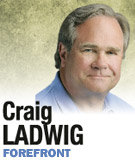Subscriber Benefit
As a subscriber you can listen to articles at work, in the car, or while you work out. Subscribe Now
 A delegation from Izvestia sat in our conference room one afternoon in the 1970s as the long-running regime of Leonid Brezhnev came to a close. The Russians were eager to tell us why Soviet journalism was better than ours.
A delegation from Izvestia sat in our conference room one afternoon in the 1970s as the long-running regime of Leonid Brezhnev came to a close. The Russians were eager to tell us why Soviet journalism was better than ours.
Their presentation went something like this: We have the only truly free press; you are dependent on advertisers and subscribers. We can write whatever we want to further mankind for the good of all, not just for the rich.
Today that view survives at—of all places—America’s richest journalism schools. A friend teaching the craft here blames the troubles of today’s large daily newspapers on technological innovations and resulting market shifts. She sends me a proposal by the president of Columbia University advocating a new model of American journalism, one that is government-subsidized and therefore free of capitalist whim.
But let us step into an alternate reality. It is the work of a quite different kind of teacher of journalism, Marvin Olasky, editor of World Magazine and formerly a professor at the University of Texas School of Journalism.
Olasky told me during a visit to Fort Wayne that the journalism my friend would save, the journalism predominant in our largest markets today, is a throwback to the crusading newspapers of the Pulitzer era.
In this school of journalism, Olasky explains in his history of American newspapers, problems arise not from personal corruption but from external influences: “The role of the new journalist is to put a spotlight on those influences. The hope is that if man’s environment is changed, man himself changes—and poverty, war and so on, are no more.”
Beginning in the 1970s, the large American newspapers, secure in monopoly, abandoned en masse their constitutional charge—the difficult and expensive job of digging up facts to provide a check on the powerful in government and out.
Their newsrooms filled with Pulitzer-style “advocacy” journalists, lecturing and improving a hapless readership through application of higher social and political sensitivity.
Can anybody be surprised now that nobody wants to pay for that, be it print or digital? Market penetration began to decline years before the Internet took hold.
What is the future of journalism?
First of all, you can hold the subsidies. The death of The New York Times or even our beloved Indianapolis Star does not necessarily mean a net decline in the prescient information necessary for our constitutional republic to flourish. It certainly doesn’t justify assigning government a seat at the editorial board.
An information system modeled, say, after Fox News, The Wall Street Journal, Indianapolis Business Journal or even your brother-in-law’s blog might well step into any market void with a more successful business plan and editorial philosophy.
You should know that publishers of the smaller community newspapers, specialty papers and media systems throughout the nation were outperforming the big shots until the recession, their closeness to their readerships saving them from the hubris of advocacy.
Incidentally, our gifts to the Soviet delegation that day included a copy of Mark Twain’s classic short story “Journalism in Tennessee.” There is a passage where the editor-in-chief, a fiercely independent fellow after Olasky’s model, gives his apprentice the plan for the day:
“Jones will be here at three—cowhide him. Gillespie will call earlier, perhaps—throw him out of the window. Ferguson will be along about four—kill him. The cowhides are under the table; weapons in the drawer; ammunition there in the corner; lint and bandages up there in the pigeonholes. In case of accident, go to Lancet, the surgeon, downstairs. He advertises—we take it out in trade.”
The humor was lost on our Russian visitors—as it is, we suspect, on our friends in the journalism academies.•
__________
Ladwig edits Indiana Policy Review, a quarterly journal studying local public policy. Send comments on this column to [email protected].
Please enable JavaScript to view this content.
